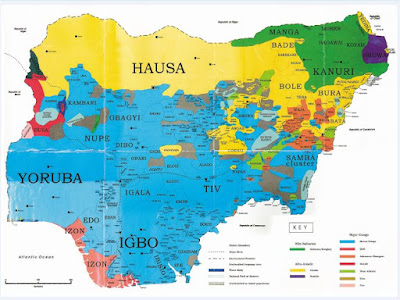Like most other African countries, the British grouped people together for governance without respect for their religious, linguistic, and ethnic differences.
Nigeria, which gained independence from the United Kingdom in 1960, had at that time a population of 60 million people consisting of nearly 300 differing ethnic and cultural groups.
More than fifty years earlier, the United Kingdom had carved an area out of West Africa containing hundreds of different ethnic groups and unified it, calling it Nigeria. Although the area contained many different groups, the three predominant groups were the Igbo, which formed between 60–70% of the population in the southeast; the Hausa-Fulani, which formed about 65% of the peoples in the northern part of the territory; and the Yoruba, which formed about 75% of the population in the southwestern part. Although these groups have their own homelands, by the 1960s they were dispersed across Nigeria, with all three ethnic groups represented substantially in major cities.
The semi-feudal and Islamic Hausa-Fulani in the North were traditionally ruled by a feudal, conservative Islamic hierarchy consisting of Emirs who, in turn, owed their allegiance to a supreme Sultan. This Sultan was regarded as the source of all political power and religious authority.
The Yoruba political system in the southwest, like that of the Hausa-Fulani, also consisted of a series of monarchs, the Oba. The Yoruba monarchs, however, were less autocratic than those in the North, and the political and social system of the Yoruba accordingly allowed for greater upward mobility based on acquired rather than inherited wealth and title.
The Igbo in the southeast, in contrast to the two other groups, lived mostly in autonomous, democratically organised communities, although there were monarchs in many of these ancient cities such as the Kingdom of Nri. In its zenith the Kingdom controlled most of Igbo land, including influence on the Anioma people, Arochukwu (which controlled slavery in Igbo), and Onitsha land. Unlike the other two regions, decisions among the Igbo were made by a general assembly in which men could participate.

No comments:
Post a Comment